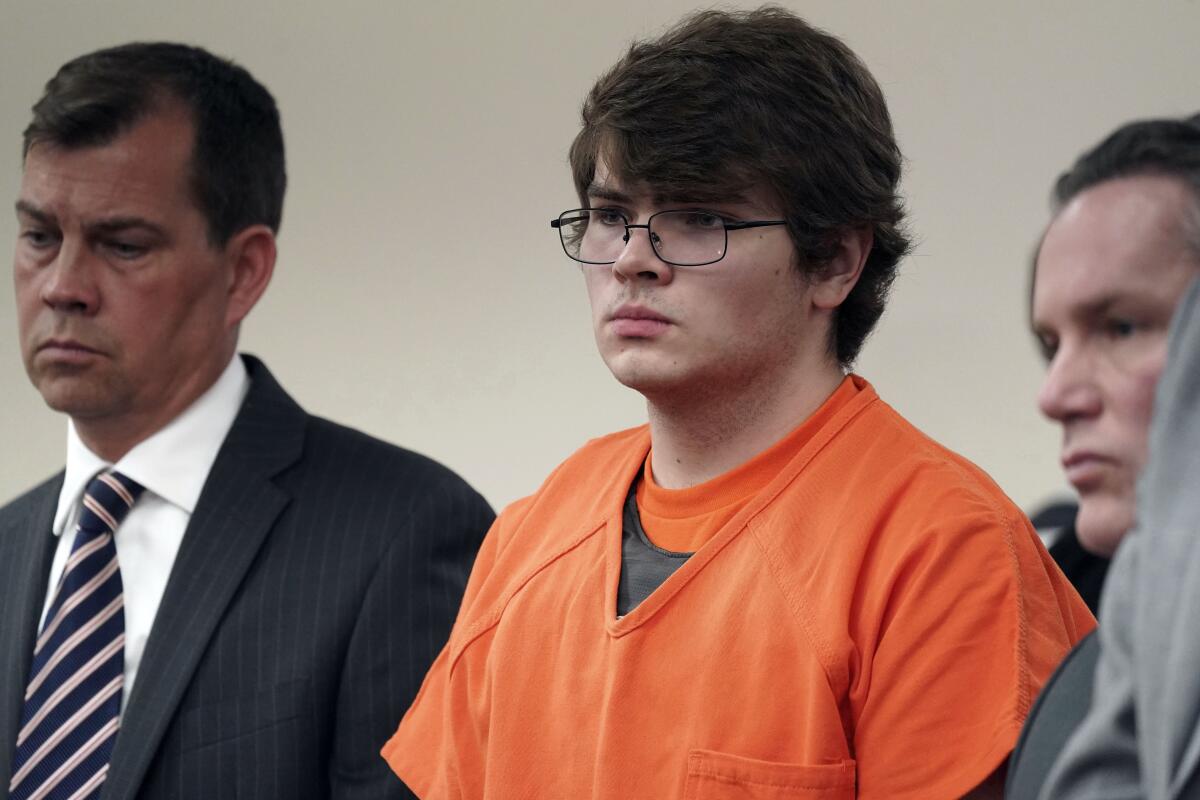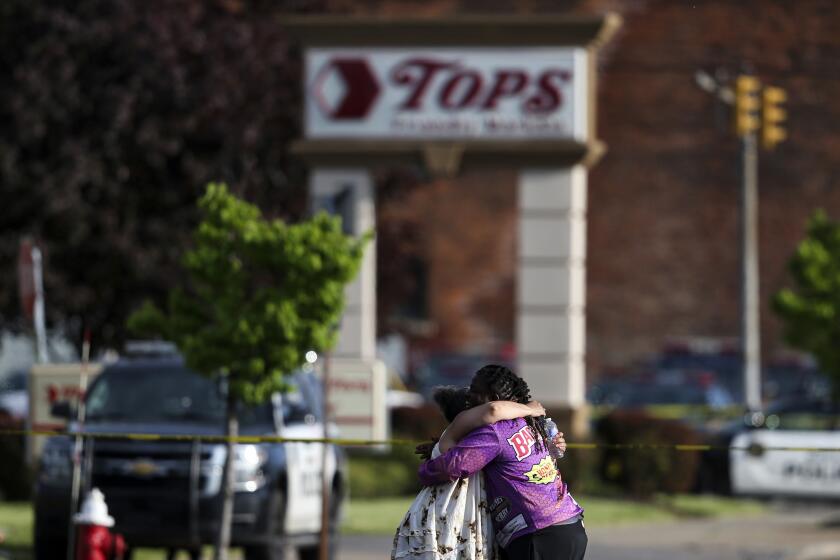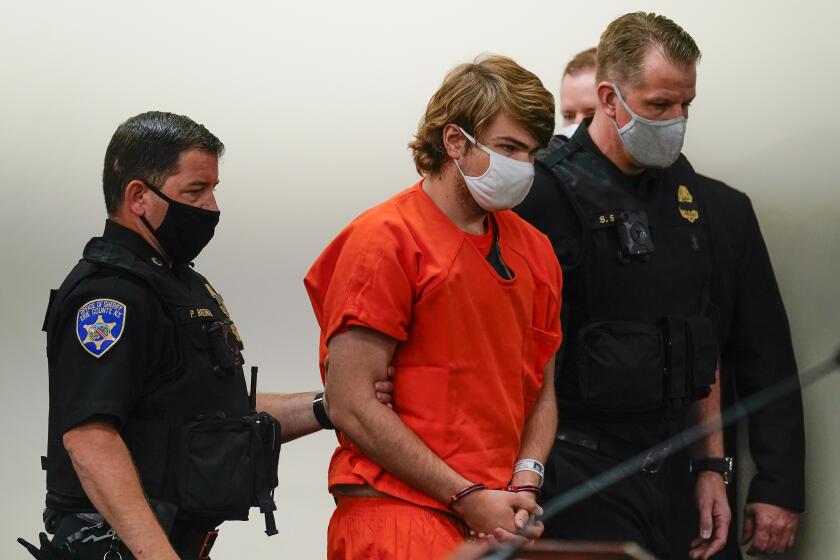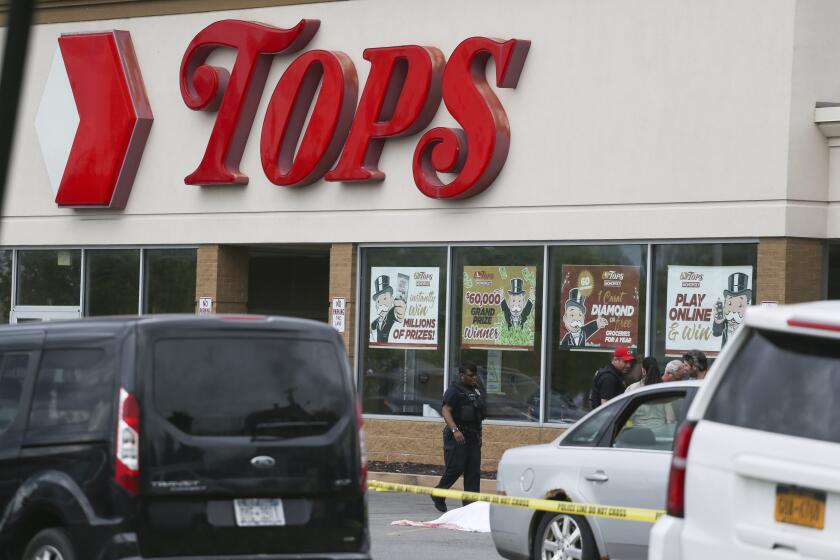Buffalo supermarket gunman will face the death penalty in federal hate crimes case

- Share via
BUFFALO, N.Y. — Federal prosecutors will seek the death penalty against a white supremacist who killed 10 Black people at a Buffalo supermarket, they said in a court filing Friday.
Payton Gendron, 20, is already serving a sentence of life in prison with no chance of parole after he pleaded guilty to state charges of murder and hate-motivated domestic terrorism in the 2022 attack.
New York does not have capital punishment, but the Justice Department had the option of seeking the death penalty in a separate federal hate crimes case. Gendron had promised to plead guilty in the state case if prosecutors agreed not to seek the death penalty.
In a notice announcing the decision to seek the death penalty, Trini Ross, the U.S. attorney for western New York, wrote that Gendron had selected the supermarket “in order to maximize the number of Black victims.”
Buffalo, N.Y., pauses to mark one year since a white supremacist gunman killed 10 Black people and wounded three at a supermarket.
The notice cited a range of factors for the decision, including the substantial planning leading to the shooting and the decision to target at least one victim who was “particularly vulnerable due to old age and infirmity.”
Relatives of the victims had expressed mixed views on whether they thought federal prosecutors should pursue the death penalty. After meeting with prosecutors hours before a Friday hearing in the case, one of the relatives, Mark Talley, shared his thoughts.
“I’m not necessarily disappointed in the decision. ... It would have satisfied me more knowing he would have spent the rest of his life in prison being surrounded by the population of people he tried to kill,” said Talley, whose 63-year-old mother, Geraldine Talley, was killed.
“I would prefer he spend the rest of his life in prison suffering every day,” he added.
The white man accused of killing 10 Black people in a racist attack on a Buffalo supermarket has been indicted by a grand jury on a state domestic terrorism and hate crime charge that would carry a mandatory sentence of life in prison.
Several other family members of victims left without speaking.
The Justice Department has made federal death penalty cases a rarity since the election of President Biden, a Democrat who opposes capital punishment. This is the first time Atty. Gen. Merrick Garland has authorized a new pursuit of the death penalty. Under his leadership, the Justice Department has permitted the continuation of two capital prosecutions and withdrawn from pursuing death in more than two dozen cases.
Garland instituted a moratorium on federal executions in 2021 pending a review of procedures. Although the moratorium does not prevent prosecutors from seeking death sentences, the Justice Department has done so sparingly.
It successfully sought the death penalty for an antisemitic gunman who murdered 11 people at a Pittsburgh synagogue, a case that had been authorized for the death penalty before Garland became attorney general. It also went ahead last year with an effort to get the death sentence against an Islamic extremist who killed eight people on a New York City bike path, though a lack of a unanimous jury meant that prosecution resulted in a life sentence.
The Justice Department has declined to pursue the death penalty in other mass killings. It passed on seeking the execution of a gunman who killed 23 people at a Walmart in El Paso.
The suspect is in custody and being questioned by the FBI.
On May 14, 2022, Gendron attacked shoppers and workers with a semiautomatic rifle at a Tops Friendly Market in Buffalo after driving more than 200 miles from his home in rural Conklin, N.Y.
He chose the business for its location in a predominantly Black neighborhood and livestreamed the massacre from a camera attached to his tactical helmet.
The dead, who ranged in age from 32 to 86, included eight customers, the store security guard and a church deacon who drove shoppers to and from the store with their groceries. Three people were wounded but survived.
The rifle Gendron fired was marked with racial slurs and phrases such as “The Great Replacement,” a reference to a conspiracy theory that there’s a plot to diminish the influence of white people.
Associated Press writers Jake Offenhartz in New York and Lindsay Whitehurst in Washington contributed to this report.
More to Read
Sign up for Essential California
The most important California stories and recommendations in your inbox every morning.
You may occasionally receive promotional content from the Los Angeles Times.













